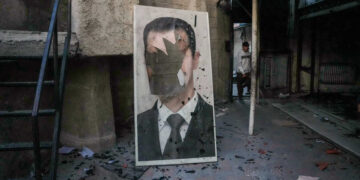Alex Martin Astley is a freelance journalist based in Beirut, covering conflict, foreign policy, and social justice issues.
To survive, the residents of eastern Ghouta were forced to dig. Under siege and amid continual attacks from Syrian and Russian warplanes, there was nowhere to escape but underground.
But they could not have known that chemical weapons would be used against them—nor that sarin, a nerve agent heavier than air, would turn the tunnels and basements where families sought refuge into mausoleums.
During Syria's 13-year civil war, this was the last area in the sprawling suburbs around Damascus to be wrested from opposition control, falling to the Assad regime in 2018. Chemical weapons are banned by the Geneva Protocol and the Chemical Weapons Convention, but on several occasions, regime forces used sarin and chlorine against civilians to gas eastern Ghouta into submission.
For years, victims of these chemical attacks had to suffer in silence. But with the sudden collapse of five decades of Assad family rule last week following a lightning offensive by rebels led by the Islamist group Hayat Tahrir al-Sham, they can speak freely for the first time.
"We thought it was a normal attack, airstrikes as usual, this time around 5 a.m. We didn't realize what was happening until we saw our neighbors coming out choking," Anas Sagherjy, 30, told Democracy in Exile.
With no detectable odor or color, sarin is an especially savage weapon of modern warfare. The first sign of its use in Ghouta was when people started dropping dead.
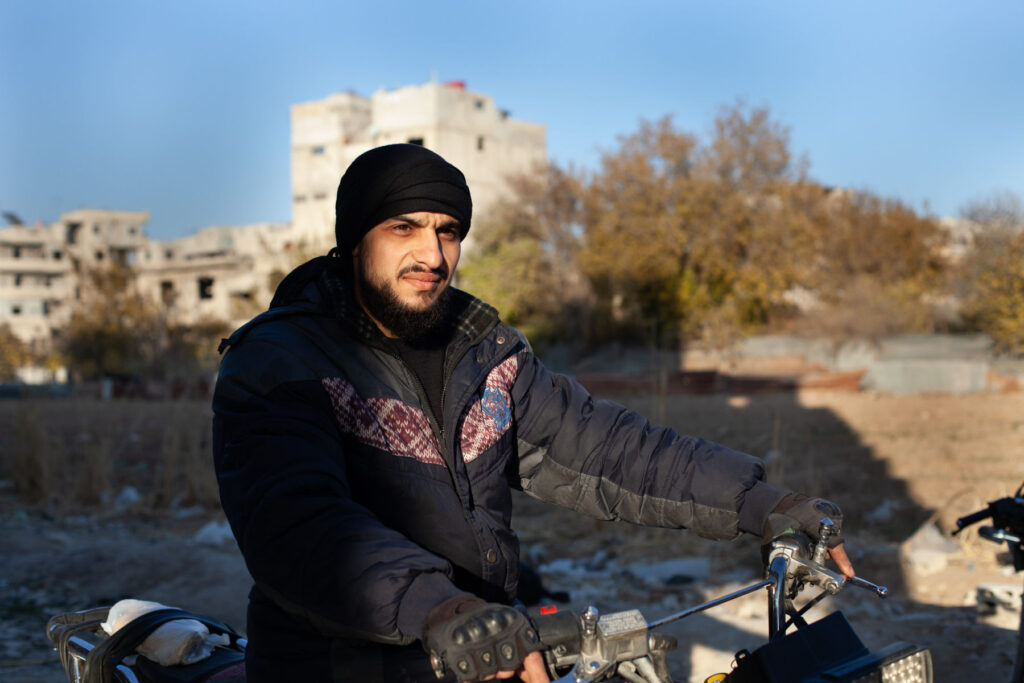
"If you didn't die in your house from the chemicals, you died outside from the missiles and the rockets. It was annihilation."
"At the hospital I saw over a hundred children on the floor, all of them dead, they had all suffocated immediately," Anas said. "Others who were helping retrieve bodies would then die on top of the dead."
"After the chemical attacks, the airstrikes would continue. When I took my mother to the hospital, they were hitting all around us," he added. "If you didn't die in your house from the chemicals, you died outside from the missiles and the rockets. It was annihilation."
In 2013, surface-to-surface rockets loaded with sarin killed thousands of people in Ghouta. Residents recall that the rockets didn't explode on impact like usual strikes from the Syrian Army; instead, people immediately couldn't breathe. The attack was widely investigated by journalists, human rights organizations and the United Nations, with weapons specialists concluding that the rockets used were in the Syrian Army's arsenal.
After then-President Barack Obama had declared that the use of chemical weapons would cross a "red line" for the United States, the sarin attack of 2013 became a pivotal moment that could have dramatically altered the course of Syria's war. But the U.S. chose not to intervene with military force. Instead, Syria agreed to sign the Chemical Weapons Convention and destroy its declared chemical arsenal. And yet, there were at least 85 chemical weapons attacks recorded between 2013 and 2018, according to Human Rights Watch, with responsibility for most of these ascribed to Assad's forces. Before the war, Syria was estimated to have one of the largest chemical arsenals in the world, and more remained despite its supposed disarmament in 2013.
"Children and women in their hundreds, all of them choked to death," Samir Bakhit, 60, told Democracy in Exile from what is left of his eastern Ghouta neighborhood. "Water would come out of their mouths. The sheep, the cows, they all died too." He pulled a blue asthma inhaler from his pocket and took two deep breaths. Though they can barely afford them, many of his neighbors have to carry one at all times now, a sign of the lasting damage done to people's lungs there.
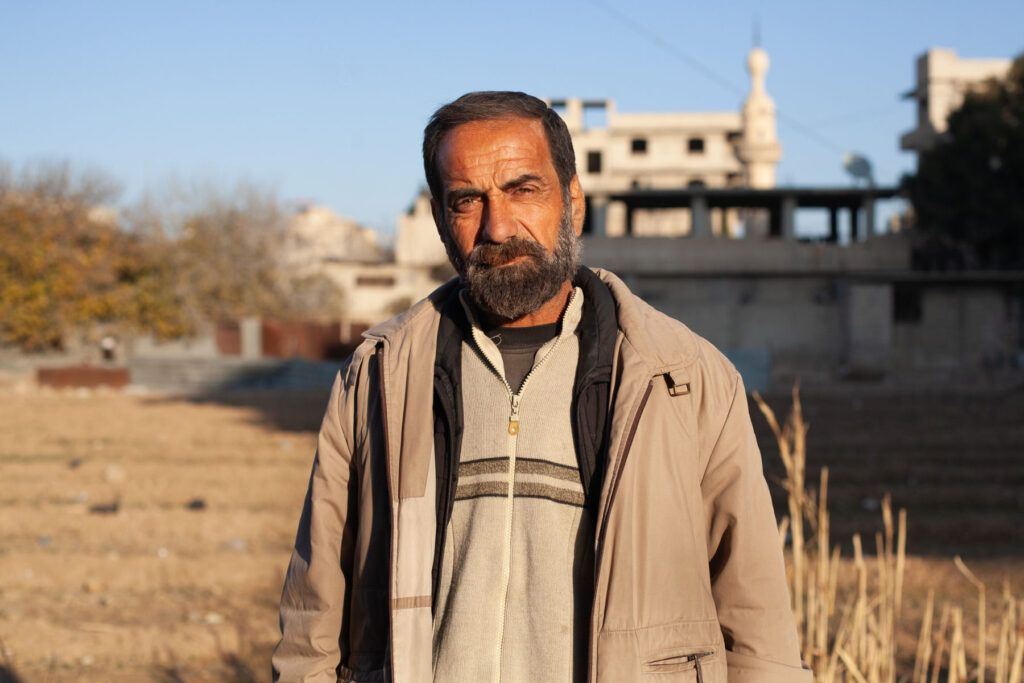
With most hospitals and clinics destroyed in the relentless blitz on Ghouta, Samir explained that residents could only turn to rudimentary field hospitals for medical attention, staffed mostly by nurses with little or no experience in dealing with chemical attacks. Anas said the resident of Ghouta used a bulldozer to make a 200-meter-long trench for all the bodies, thousands buried shoulder to shoulder. With no medical expertise in the area to confirm the deaths, he thinks some of those poisoned in the chemical attacks may have been buried alive.
Samir and Anas live in the Hazeh area of eastern Ghouta, and remained there throughout the war. As is the case in most of the southern and eastern suburbs of Damascus, their neighborhood is in ruins now. There is still no electricity or running water, and the cold on these December nights is unbearable. Years of shelling have stripped almost every apartment block down to its skeletal concrete frame. A handful have had windows and walls refitted where families have moved back in since the siege was lifted by regime forces six years ago.
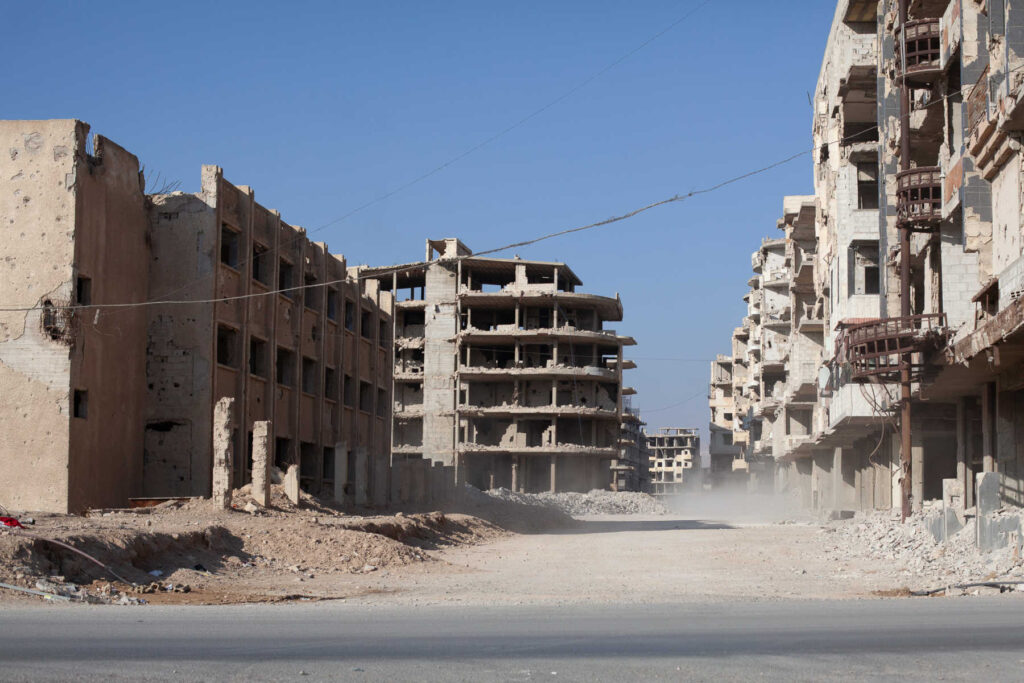
During the height of the siege in 2016, hundreds of thousands of people were squeezed into an area around 100-square kilometers. At the time, the United Nations Commission of Inquiry on Syria accused the Syrian government of war crimes and of "deliberately starving" 265,000 people.
"We were eating grass, and fodder, the same the animals were eating. There was no [Syrian] Red Crescent here," Samir said.
Other residents soon gathered around Samir to share their stories. It was the first time they had spoken to anyone outside of their community about the miserable conditions of life under siege. To stay warm, they said, they burnt trash in makeshift stoves. When the trash ran out, they would burn their own shoes. To drink water, they dug wells, knowing that these would be contaminated anyway. To find food, they dug a tunnel several miles to the town of Jobar, which still had a road open to Damascus.
Before Anas rode off on a battered motorcycle, he shared a simple request for the future of his country: "We want our children never to experience what we had to live through."
- Alex Martin Astley
In 2018, the town of Douma, the last rebel-held enclave in eastern Ghouta, was the site of another deadly chemical attack. According to the Organization for the Prohibition of Chemical Weapons, a Syrian Air Force helicopter dropped two yellow cylinders on a pair of apartment buildings, releasing highly poisonous chlorine gas. Like sarin, it sank silently through the building's floors into the basements below where at least 43 people, who had been seeking shelter from bombardment, choked to death.
The Douma attack effectively brought an end to the siege of Ghouta, with rebel fighters led by the group Jaish al-Islam surrendering the next day. More than 100,000 rebels were exiled north to Idlib as part of an agreement with the Syrian government. Many of them returned home last week, as part of the astonishing offensive led by Hayat Tahrir al-Sham that toppled the Assad dynasty in just 12 days.
But chemical attacks, aerial bombardment and starvation were not the only tools of oppression wielded by Assad's forces on eastern Ghouta. The very fact of living in the area would make you a suspect of "terrorism" in the eyes of the regime.
Anas was never a fighter, but he spent a month in the notorious Mezzeh Airport prison. He was one of 15 crammed people into a one-and-a-half meter by one meter cell, he recounted, given a slice of bread and four olives for breakfast and half a potato for dinner. Whenever a prison guard was smoking, he would put out the cigarette on Anas's head. Anas said he was almost never allowed to sit down in prison. By the time he left, he could hardly walk and needed surgery on his legs.
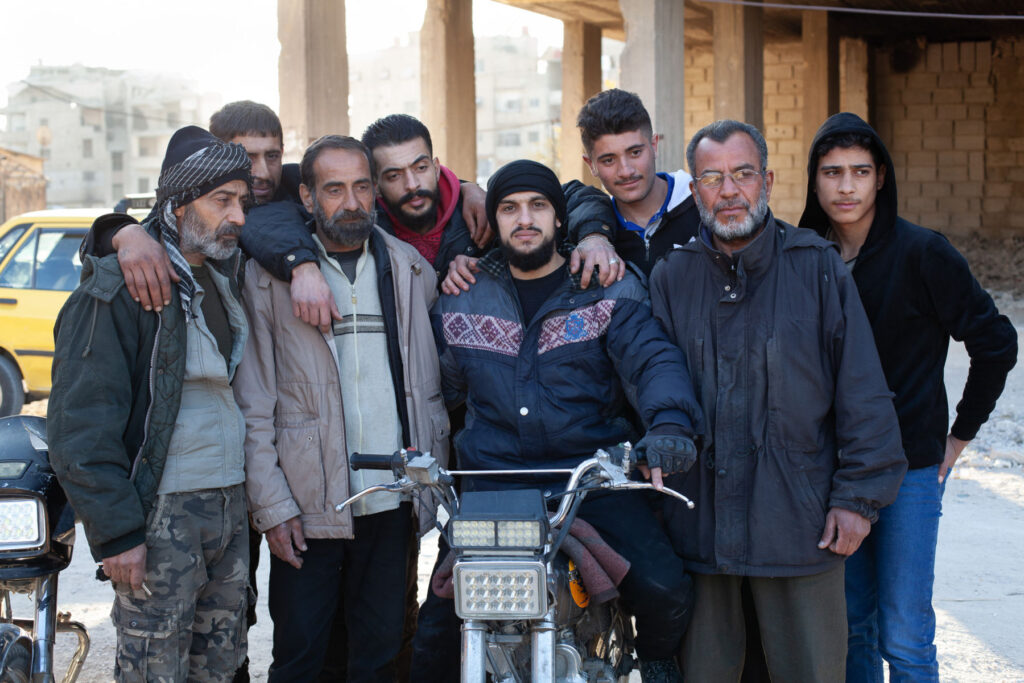
Everyone Democracy in Exile spoke with either knew someone who had been detained by the regime, or had spent time in prison themselves, invariably under torture.
Abd al-Rahman Munair, 70, was watching the gathered crowd from the sidelines. He minded his steps carefully as he walked over so as not to fall. He wanted to talk too, but since his throat was injured in prison, he struggled to get his words out clearly.
He spent "a year minus three days" in the perpetual gloom of the cells under another infamous security complex, an intelligence headquarters in Damascus known as the Palestine Branch. Abd al-Rahman said he had been arrested a few years ago for "terrorism"—he burst into dark laughter as soon as he uttered the word. "We were all terrorists here in Ghouta," he said with an ironic smile.
Before Anas rode off on a battered motorcycle, he shared a simple request for the future of his country: "We want our children never to experience what we had to live through." The crowd around him nodded in assent.
































